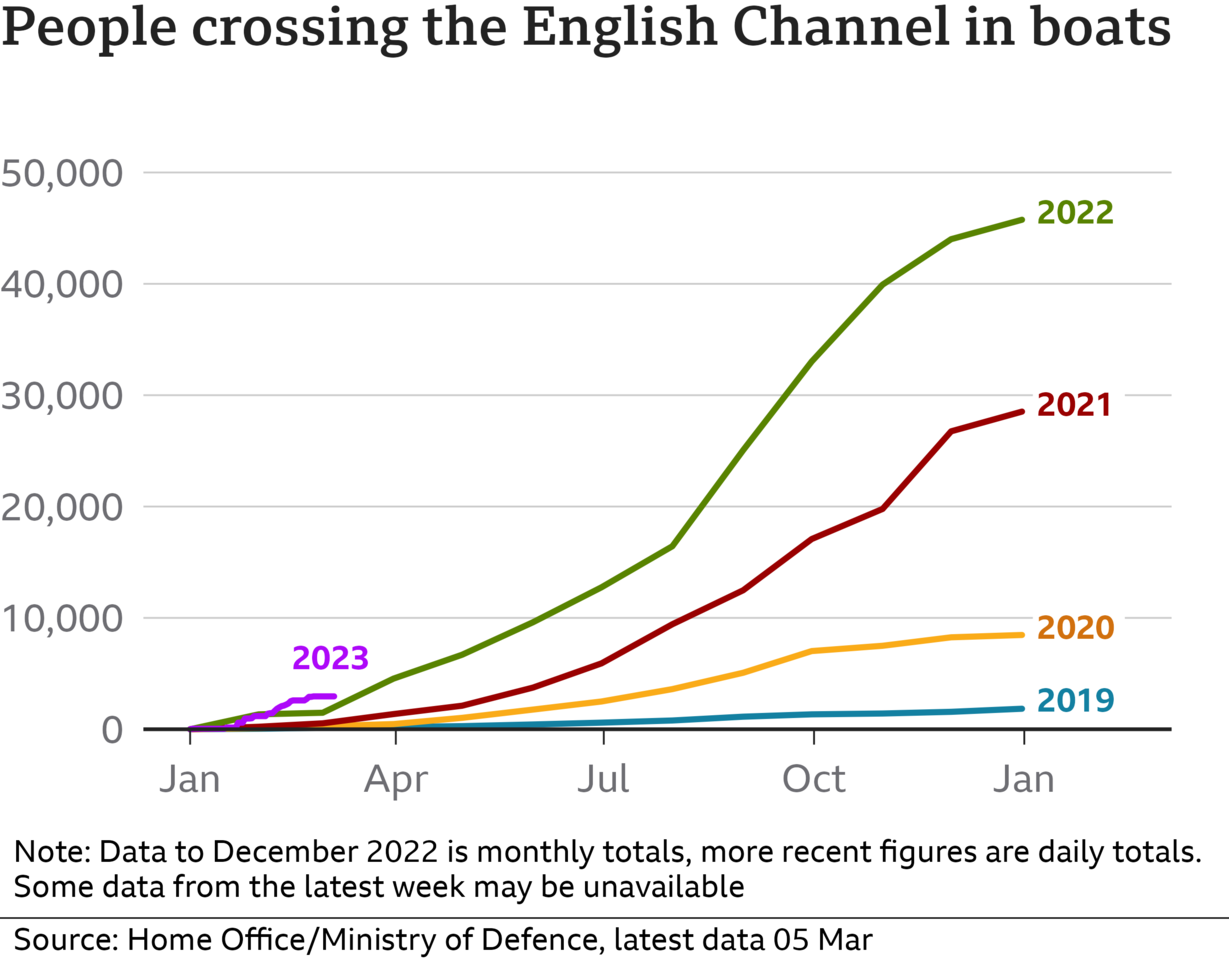
Asylum plan will stop people jumping queue - Suella Braverman
Mr Sunak clashed with Labour's Sir Keir Starmer at Prime Minister's Questions over the plan to tackle migration.
The new legislation, announced on Tuesday, aims to stop migrants from crossing the Channel to the UK.
Sir Keir said that if the PM was serious, he would steal Labour's plan and "smash" the people smuggling gangs.
He said Mr Sunak was "deluded" to think the new legislation would reduce the number of small boats, as no returns agreements with other countries were in place.
The Labour leader said that applications from less than 1% of those arriving on small boats have been processed, and said the asylum system was "broken".
"On his watch, processing of those boat cases has gone from unacceptable to almost non-existent," he said.
But Mr Sunak accused Labour of not wanting to tackle the problem, claiming Mr Starmer had "never, ever voted for tougher asylum laws".
"Stopping the boats is not just my priority, it's the people's priority," Mr Sunak told the Commons.
On Tuesday, the government announced that anyone found to have entered the country illegally would not only be removed from the UK within 28 days, but also be blocked from returning or claiming British citizenship in future.
Those who arrive in small boats would either be returned to their home country, or another "safe third country" like Rwanda.
Home Secretary Suella Braverman told the BBC earlier the British public "have had enough" of migrants arriving in small boats.
Asked on the Today programme whether the new policy was workable - and where the migrants would go - Ms Braverman said she expected around 40,000 people or more to cross the Channel this year, but acknowledged 80,000 was a possibility.
Ms Braverman said people who come to the UK by boat "jumped the queue" - although their claims do not get processed any faster than other asylum seekers, and they often wait more than six months for a decision.
She said the government's deal to send migrants arriving in the UK to Rwanda was "uncapped" - and it could potentially take thousands of people.
However, since the plans to send some UK asylum seekers to Rwanda were announced last April, no-one has yet been sent to Rwanda and the plans are still being challenged legally by human rights groups.
Labour's Yvette Cooper said the plans would make "the problems even worse, and make it more chaotic" and "more lives put at risk".
Setting out Labour's plan, she said they agreed with the aim to "stop the boats" - but that they would deal with it differently, by setting up a new cross-border police unit to go after the gangs, overhaul the asylum system and also seek new agreements with Europe to return people.
She told Today that the lack of return agreements in place would mean there would be tens of thousands of people in asylum accommodation and hotels.
The United Nations refugee agency has described the moves as "very concerning" and would block even those people with a compelling claim to asylum.
The UNHCR's representative to the UK, Vicky Tennant, told BBC Newsnight the measure would break international law.
"We believe it's a clear breach of the Refugee Convention, and remember even people with very compelling claims will simply not have the opportunity to put these forward."
The Refugee Convention, first agreed in 1951, is a multilateral treaty that sets out who qualifies as a refugee and the obligations of signatory states to protect them.
What will the new law mean?
* Migrants who arrive through unauthorised means will be removed from the UK and blocked from returning or seeking British citizenship in future
* They would only be eligible for asylum in a "safe" third country, such as Rwanda
* Migrants will not get bail or be able to seek judicial review for the first 28 days of detention
* There will be a cap on the number of refugees the UK will settle through "safe and legal routes" - set annually by Parliament
* A duty on the home secretary to detain those arriving in the UK illegally and remove them to Rwanda or a "safe" third country - this will take legal precedence over someone's right to claim asylum
* Under-18s, those medically unfit to fly, or those at risk of serious harm in the country they are being removed to will be able to delay removal
* Any other asylum claims will be heard remotely after removal
Ms Braverman has written to Conservative MPs saying there is "more than a 50% chance" the legislation is not compatible with the European Court of Human Rights (ECHR), and it is expected to face legal challenges.
She told BBC Breakfast her measures were "lawful, proportionate and compassionate".
She said ministers wanted to test the boundaries of legal obligations - but believed their plans were within those limits.
"We are confident that we are complying with the law, domestic and international," she told the Today programme. "But we are also pushing the boundaries and we are testing innovative and novel legal arguments."
Charity the Migrants Rights Network said it was incorrect to say people arriving via small boats were jumping the queue, and that they "end up in a backlog that is the result of poor government infrastructure and years of hostile environment policies".
It added: "The majority of displaced people stay in neighbouring countries to their country of origin or in other countries in Europe. Germany, for example, takes three times the number the UK does. The relatively few that come to the UK do so because they have family ties or speak English."
The Children's Commissioner for England, Dame Rachel de Souza, said the new legislation was "opaque on what it means for children" and she was "seeking urgent clarity from the Home Office".












